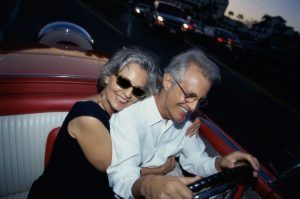
Although a patient with glaucoma may not have any difficulties driving during the day, they may notice that at night they experience glares, decreased contrast, and overall poorer vision, all of which can affect their ability to drive safely.
Some of the challenges of night driving with glaucoma include slowness to anticipate and respond to road changes, difficulties matching speed when changing lanes, and difficulties maintaining the lane especially on curvy roads. These shortcomings can be dangerous not only for the driver but for other drivers, too, and even pedestrians on the road at night. Therefore, night driving with glaucoma is a serious safety concern.
When should glaucoma patients stop driving?
For many people, not being able to drive may feel like a loss of independence and freedom. But if you struggle with driving due to glaucoma or other health issue, you will need to call it quits. Glaucoma patients should stop driving if they experience vision loss – especially side vision – if they develop sensitivities to light, if their vision becomes blurred, or if they begin to experience crashes or “near misses.”
Although your doctor will be able to properly assess your vision and give you a definite answer, you should also track your deteriorating vision and act responsibly. Giving up driving may be difficult, but it’s important that you keep yourself and those around you safe. This is particularly important if your eye problems are affecting your nighttime driving.
Driving when you have glaucoma
A glaucoma diagnosis does not automatically mean you have to stop driving altogether. As long as it is caught early enough and your vision is not affected, you are good to go. It’s important that you always keep your eye glass or contact prescription up-to-date so that you maintain sharp vision behind the wheel.
To make sure you have a sufficient quality of vision to drive, you will need to see your doctor for an eye exam and pass your driver license eye test.
If you are ever concerned about your driving ability, especially at night, ask a friend for a ride, take public transit, or call a taxi. It’s better to arrive alive and safe than to run the risk by getting behind the wheel.